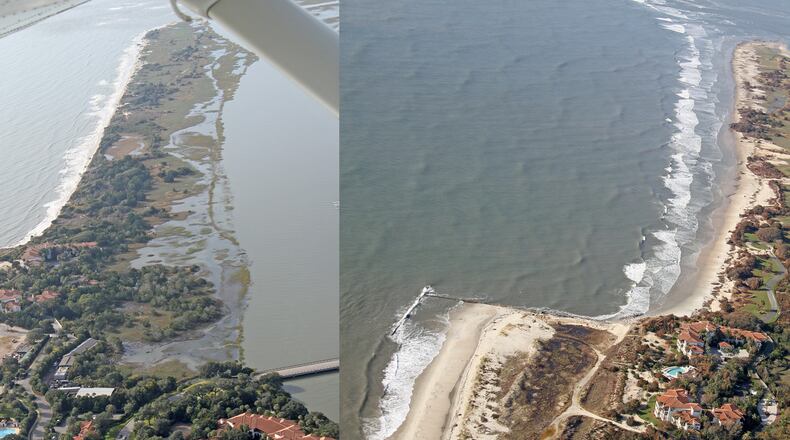Developers have halted marketing of the site of proposed upscale housing on an undeveloped piece of land on Sea Island after Hurricane Irma damaged the property.
Sea Island President Scott Steilen said the storm damaged part of the unprotected area of the island off the Georgia coast.
Environmentalists counter that at The Reserve at Sea Island, the damage is man-made — by Sea Island Co.’s insistence on developing the “spit” of land that runs below the famed Cloister hotel.
In a statement Tuesday, Steilen said the company has contacted the state Department of Natural Resources and the Army Corps of Engineers to discuss the need for immediate maintenance and repairs, as well as any other preventive measures that could be taken.
DNR spokesman Wes Robinson said Tuesday that the agency had not yet received any requests to work on the land. The DNR would have to authorize the work under the Coastal Marshlands Protection Act or the Shore Protection Act, Robinson said.
Ever since Sea Island Co. emerged from bankruptcy in 2010, developers have eyed the spit, a mile-long strip of sand, marsh and pine scrub favored by horseback riders, sea turtles and shorebirds.
A wood bridge and paved road now lead to site of The Reserve, the well-manicured yet undeveloped home site overlooking the ocean on one side and the Black Banks River on the other. Eight lots have been carved from 8 acres. An additional 80 acres have been placed into a conservation easement never to be developed.
James Holland, a retired Altahama Riverkeeper who has made it his personal task to take monthly aerial photographs of the piece of land since 2013, said Hurricane Irma caused several feet of beach erosion the length of the spit, blew sand into the marsh, threatening the vegetation that grows there, and downed several trees.
Holland said he hopes this year’s damage causes Sea Island Co. to abandon the project.
The spit’s instability makes the properties ineligible for federal flood insurance — the only such spot on Sea Island. Between 2003 and 2013, the spit’s beach shrank by 108 feet, a rate more than double the mean erosion rate, a Georgia Southern University geologist said.
A state judge's ruling last year allowed Sea Island Co. to truck sand to the development and rebuild the beach after Hurricane Matthew washed away large chunks of dune and a broad swath of sand below an existing sea wall used to renourish the beach. The company is awaiting final approval from the Army Corps of Engineers.
Holland said he will continue to monitor the progress of the project because of his love for the state’s coastal lands and marshes.
“Quite frankly, between you and I,” he said, “no one else is looking after them.”
About the Author
Keep Reading
The Latest
Featured



